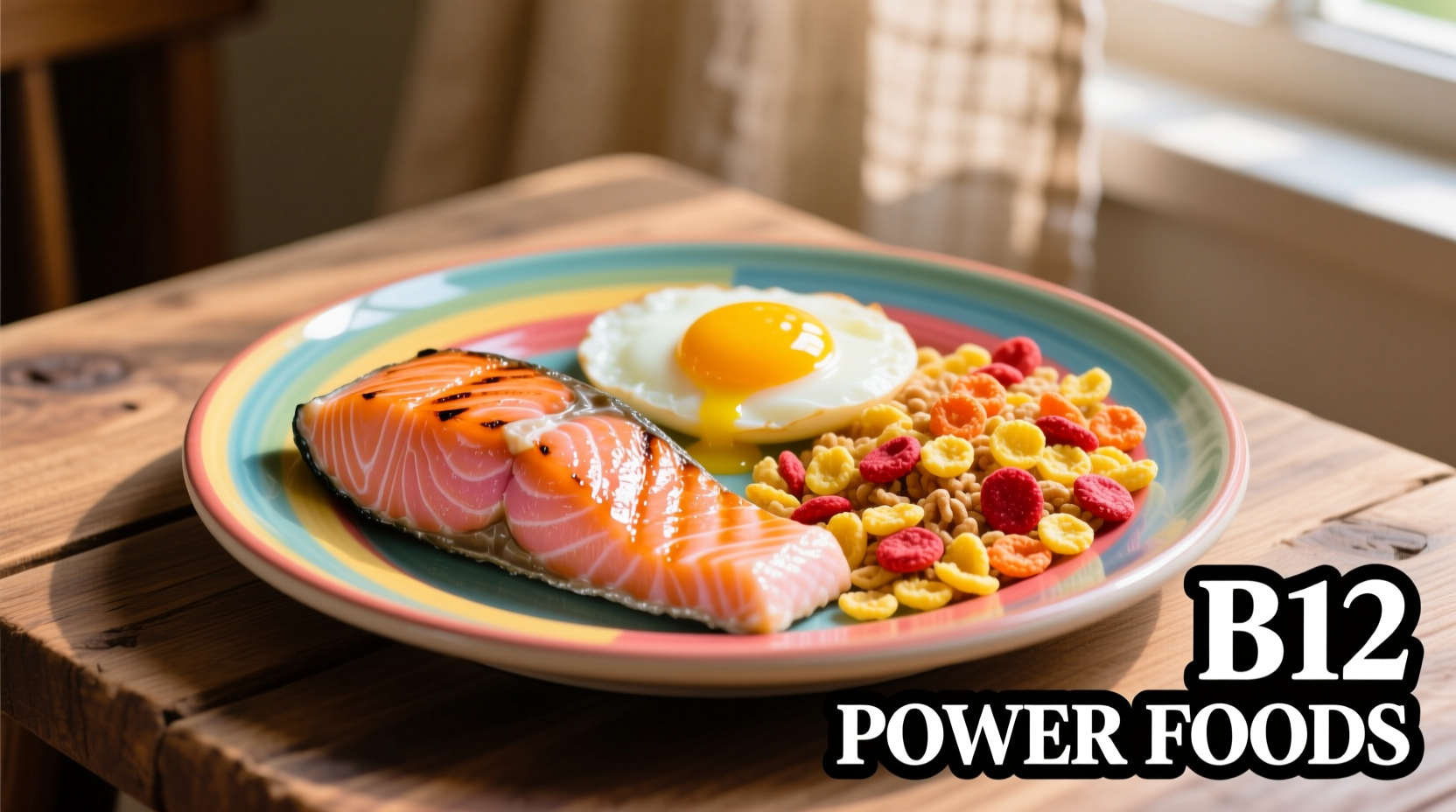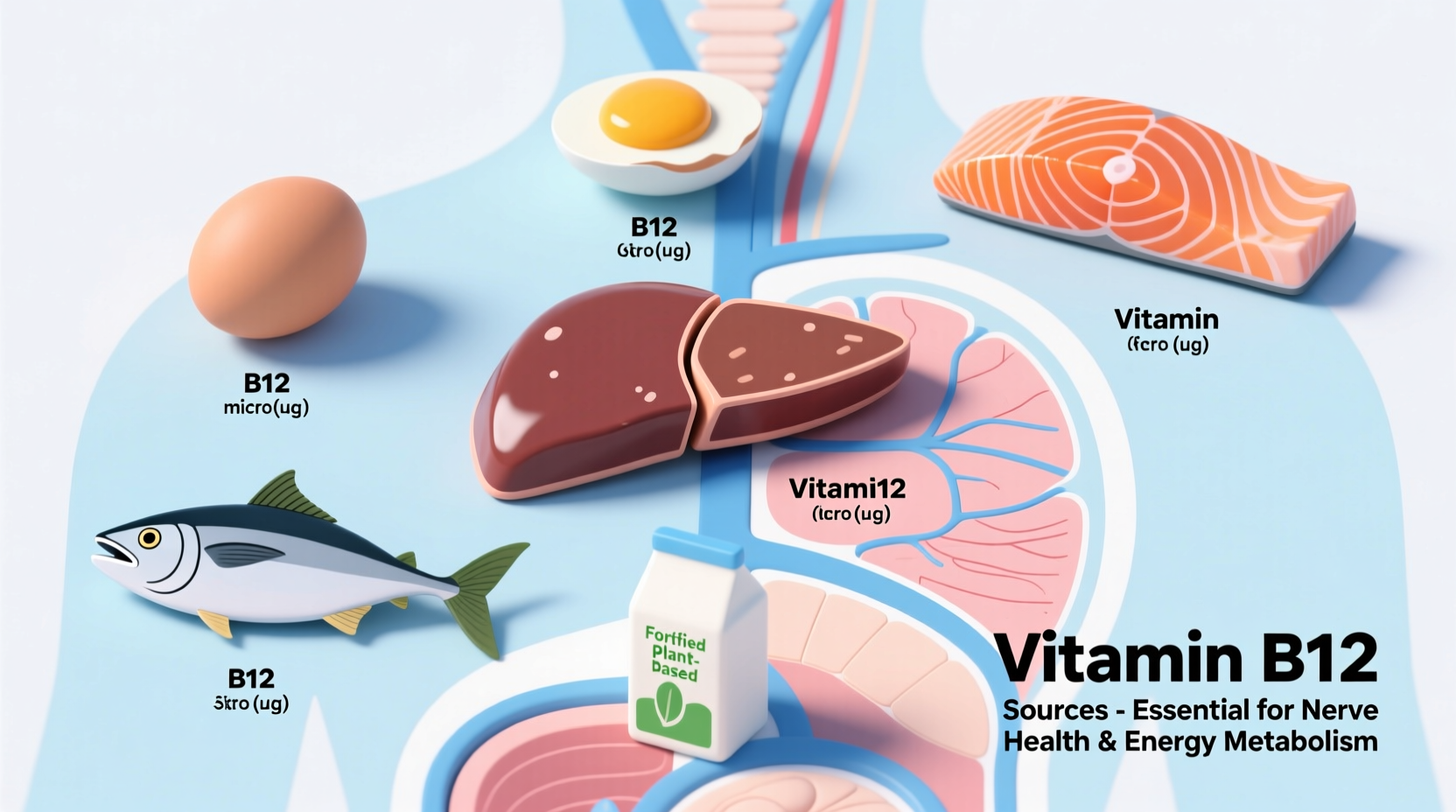Why Vitamin B12 Matters for Your Health
Vitamin B12, also known as cobalamin, plays a critical role in your body's fundamental processes. This water-soluble vitamin supports red blood cell formation, neurological function, and DNA synthesis. Unlike other vitamins, your body can't produce B12 naturally - you must obtain it through dietary sources or supplements.
Deficiency can lead to serious health issues including anemia, fatigue, memory problems, and nerve damage. Certain populations face higher risk, including older adults (due to reduced absorption), vegetarians and vegans (without proper supplementation), and people with gastrointestinal disorders.
Natural Animal-Based Sources of Vitamin B12
Animal products remain the most concentrated natural sources of bioavailable B12. The vitamin occurs naturally in these foods because animals either produce it themselves or accumulate it through their diet.
| Food Source | Portion Size | B12 Content (mcg) | % Daily Value |
|---|---|---|---|
| Clams (cooked) | 3 ounces | 84.1 | 3,504% |
| Liver (beef, cooked) | 3 ounces | 70.7 | 2,946% |
| Trout (rainbow, wild, cooked) | 3 ounces | 5.4 | 225% |
| Salmon (sockeye, cooked) | 3 ounces | 4.8 | 200% |
| Tuna (light, canned in water) | 3 ounces | 2.5 | 104% |
| Fortified breakfast cereal | 1 serving | 6.0 | 250% |
| Nutritional yeast (fortified) | 2 tablespoons | 4.0 | 167% |
| Milk (whole) | 1 cup | 1.2 | 50% |
| Yogurt (plain, low-fat) | 1 cup | 1.1 | 46% |
| Eggs (large) | 2 eggs | 0.9 | 38% |
According to the National Institutes of Health Office of Dietary Supplements, animal liver and certain shellfish contain exceptionally high concentrations of B12. This reflects historical dietary patterns where hunter-gatherer societies consumed organ meats that provided abundant B12.
Plant-Based and Fortified Options for Vegetarians and Vegans
For those following plant-based diets, natural B12 sources are limited since plants don't produce this vitamin. However, several fortified options provide reliable alternatives:
- Fortified nutritional yeast - A popular vegan cheese substitute that typically contains 4-8 mcg per serving
- Fortified plant milks - Soy, almond, and oat milks often contain 1-3 mcg per cup
- Fortified breakfast cereals - Many contain 100% of the daily value per serving
- Fortified meat substitutes - Some vegan burgers and sausages include B12
The Academy of Nutrition and Dietetics confirms that fortified foods and supplements are essential for maintaining adequate B12 levels in vegetarian and vegan diets. Unlike animal sources where B12 binds to protein, fortified foods often use crystalline B12 which has higher bioavailability.

Factors Affecting B12 Absorption
Not all consumed B12 gets absorbed equally. Several factors influence how much your body can utilize:
- Intrinsic factor - A stomach protein necessary for B12 absorption; deficiency causes pernicious anemia
- Age - Absorption decreases significantly after age 50 due to reduced stomach acid
- Medications - Proton pump inhibitors and metformin can interfere with absorption
- Dosage - Large supplemental doses have lower absorption rates than smaller, frequent doses
Research from the Mayo Clinic shows that while food-bound B12 requires stomach acid for release, crystalline B12 from supplements and fortified foods bypasses this step, making it more accessible for older adults.
Practical Meal Planning Strategies
Incorporating B12-rich foods into your daily routine doesn't have to be complicated. Here are actionable approaches:
For Omnivores
- Start your day with two eggs (providing nearly 40% of daily needs)
- Include fatty fish like salmon in meals 2-3 times weekly
- Choose dairy products as snacks or in recipes
For Vegetarians
- Combine dairy and eggs with fortified nutritional yeast
- Use fortified plant milks in smoothies and cereals
- Include one fortified cereal serving daily
For Vegans
- Consume fortified nutritional yeast daily (2-4 tablespoons)
- Choose multiple fortified foods throughout the day
- Consider a B12 supplement providing 250-500 mcg daily
Remember that consistency matters more than single large doses. Spreading intake throughout the day improves absorption rates. The USDA FoodData Central database shows that regular consumption of even moderate-B12 foods provides sufficient daily intake when combined strategically.
Key Takeaways for Optimal B12 Intake
Understanding vitamin B12 sources helps ensure you meet your nutritional needs regardless of dietary preferences. Animal products provide the most concentrated natural sources, while fortified options make plant-based diets viable with proper planning. Pay attention to absorption factors, especially if you're over 50 or follow a vegetarian/vegan lifestyle.
Regular blood tests can help monitor your B12 status, particularly if you belong to a high-risk group. When in doubt about your dietary needs, consult with a registered dietitian who can provide personalized recommendations based on your health status and eating patterns.
Frequently Asked Questions
Can you get enough B12 from plant foods alone?
No, natural plant foods don't contain reliable B12. Vegetarians and vegans must consume fortified foods or supplements to meet requirements.
How much B12 do I need daily?
Adults need 2.4 micrograms daily. Pregnant women require 2.6 mcg, and breastfeeding women need 2.8 mcg according to the National Academy of Medicine.
Are B12 supplements safe?
Yes, B12 supplements are generally safe as your body excretes excess amounts. The NIH confirms no adverse effects have been associated with high intakes from food or supplements in healthy individuals.
How can I tell if I'm B12 deficient?
Symptoms include fatigue, weakness, constipation, loss of appetite, and neurological changes. Blood tests measuring serum B12 levels provide definitive diagnosis.











 浙公网安备
33010002000092号
浙公网安备
33010002000092号 浙B2-20120091-4
浙B2-20120091-4